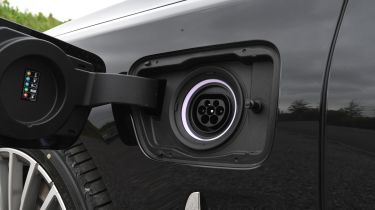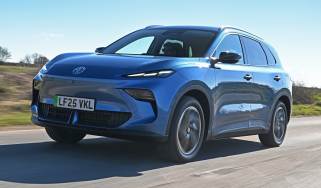BMW 7 Series hybrid range, MPG, CO2 & charging
Following updates, the BMW 7 Series hybrid now has a longer electric range and lower CO2 emissions than before
| Electric range | Fuel economy | CO2 emissions | Wallbox charge time |
|---|---|---|---|
| 29-32 miles | 118-141mpg | 45-54g/km | 3hrs 30mins |
Featuring a 12kWh battery, the BMW 7 Series hybrid returns between 29 (for the long-wheelbase) and 32 (for the short-wheelbase) miles of electric range, according to official tests. In the real world, we saw around 25 miles, although those driving fewer motorway miles will likely achieve more than we did. This compares favourably to the Mercedes S-Class hybrid, which has a bigger battery but less range to show for it.
BMW 7 Series hybrid range, MPG & CO2 emissions
As a plug-in hybrid, the BMW 745e boasts an official fuel-economy figure well into triple figures. However, getting anywhere near the claimed 118-141mpg in the real world will depend on you plugging the car in regularly to maximise its electric running. Provided that you can charge the 745e at home, the electric range should be enough for most people to cover short commutes or trips to the shops without touching the petrol in the fuel tank.
After the battery has depleted, however, you’ll be relying on the 3.0-litre engine while performance is very good, its six cylinders are thirsty. If you can’t keep the battery topped up, the 7 Series’ non-hybrid siblings – lighter owing to the lack of a battery – are likely to be better choices in the long run. Another perk of the plug-in hybrid system is low CO2 emissions: official tests rate the 7 Series hybrid’s emissions at between 46 and 62g/km, which gives free access to the London Congestion Charge zone until the current rules are revised in October 2021.
Charge time
Compared to the much bigger batteries you’ll find in pure-electric cars, the 12kWh unit found in the 7 Series is far smaller. This means it can be charged relatively quickly, with a home wallbox supply capable of delivering a full top-up in around three-and-a-half hours. From the slower supply typically provided by domestic three-pin sockets, you’re looking at just over five hours for a full charge; easily achievable if you plug in the moment you get home, or if you leave the car charging overnight.



